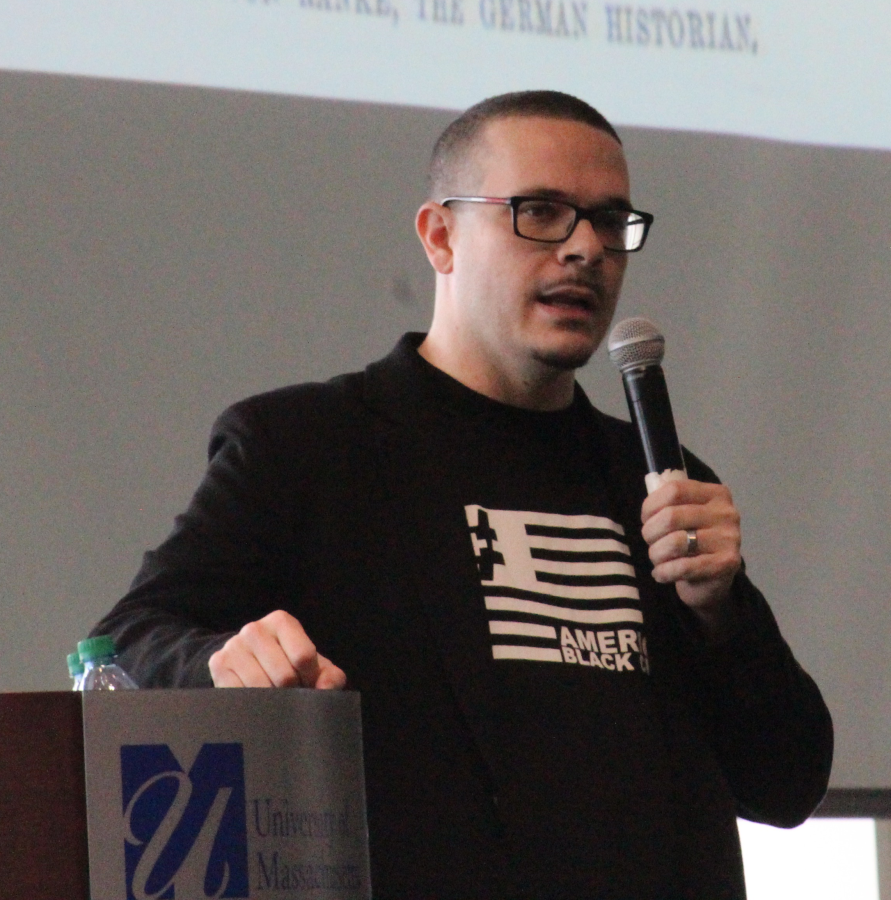On Nov. 2, Shaun King, a leading activist of the Black Lives Matter Movement who gained recognition through his use of social media, came to the University of Massachusetts Boston to speak about what he calls “the new Civil Rights Movement” during an event sponsored by The Mass Media. Approximately 100 students, faculty, and staff attended.
In an interview with The Mass Media, King said that he was inspired to begin his work as a civil rights activist after Trayvon Martin and Eric Garner were murdered in 2012 and 2014, respectively. These murders were nationally recognized by civil rights activists as racially-motivated.
King started using his private Facebook page for activism after a friend from college shared a video of the murder of Garner. King began to share his experience with police brutality, and, as his friends began to ask him for more reports, his recounts became viral. Now, King has nearly 1.6 million followers on Facebook.
“I was just writing on my Facebook page my own recounting of different cases of police brutality, just for my friends… Because of social media, it allowed local injustice to resonate nationally,” King told The Mass Media.
“It really started in July 2014 when Eric Garner was killed and I would read stories about him. I just thought they were poorly written and they were never from the perspective of victims, they were always from the perspective of almost exclusively police. I thought, at the very least, there’s gotta be two sides to this story and so I just started writing that other side.”
Because of King’s posts on the police brutality Garner faced, he was offered a job at a liberal news website, The Daily Kos, and later, The Daily News. While holding the position, he interviewed Martin’s parents, according to a Facebook update he posted nine months ago.
“Before I was writing about criminal justice, even though I worked for my school newspaper as an undergrad, I never thought I was going to be a full-time journalist, that wasn’t even a goal,” King said. “But I’d always loved to write.”
During the question and answer portion of the event, a UMass Boston student asked about the uncertainty regarding King’s racial identity. He has received much criticism about his race throughout his career, some questioning his African American heritage.
When he was interviewed on CNN by Don Lemon in 2015, he was compared to Rachel Dolezal, the former president of a Washington state chapter of the NAACP, who later revealed after her resignation that she was actually of European descent. King has expressed much frustration when pressed on the subject. In an email he sent in response to CNN in 2015, he said that he has “opted to never appear on CNN again.” King’s Wikipedia page states that his biological father was of mixed race and his mother, white.
“Read my Wikipedia page… it’s uncomfortable questioning,” King said to the student.
He is currently working for the Intercept, an online news organization, which, according to King, focuses on “investigative journalism.” King is also involved in the Fair Punishment Project, a joint leadership between Harvard Law School’s Charles Hamilton Houston Institute for Race & Justice and its Criminal Justice Institute, which describes itself as a project that helps to create “a just legal system through legal action, public disclosure, and educational initiatives.”
But, according to King, the Black Lives Matter Movement is only a sliver of the many social issues that need advocacy.
“What I’m fighting for is bigger than the Black Lives Matter Movement,” said King.
In his closing thoughts at the interview, King said, “There are a few bits of advice that I’d give to students: you have to pick an issue that disturbs you the most and settle in on that… Make an informed valued decision… It’s not about mimicking what somebody else does, but choosing it for yourself.”





















































